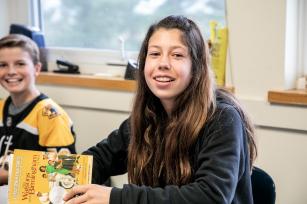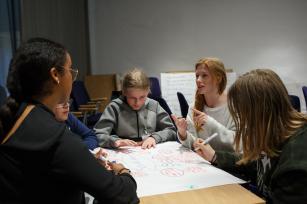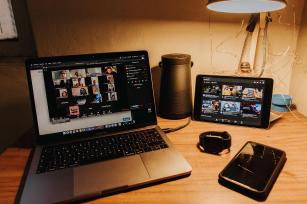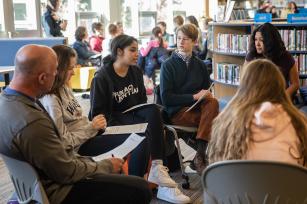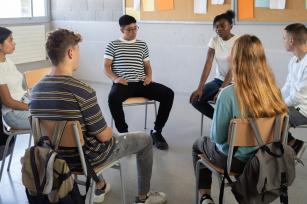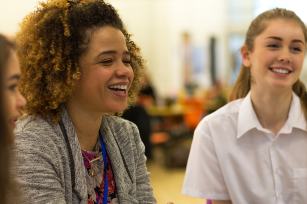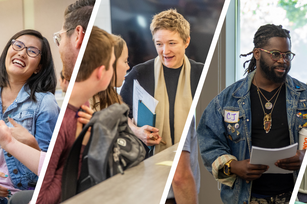
Breadcrumb
- Essential Partners
- Our Impact
- Impact Stories
- Civility in Education: A Collaboration with Cody High School (WY)
Civility in Education: A Collaboration with Cody High School (WY)
“I am so thankful to have been able to experience this program … I feel that a part of me has grown and changed into something even better, all because of everything we did.”
Cody High School Student
In 2019, Cody High School in Wyoming was selected to participate in a grant-funded pilot project with Essential Partners. Five teachers, nineteen students, and eight community members—parents, the superintendent, a local librarian, the leader of an afterschool program— participated in multiple days of in-person training as well as webinars and individualized coaching.
The goal of the project was to develop, implement, and evaluate a new curriculum for secondary school students, teachers, and community members that could effectively improve the quality of engagement around conflict or differing viewpoints, and to build skills and norms that would lead to more curiosity, openness to new ideas, and willingness to learn from others.
“We want to develop a whole generation that can resist polarization, engage one another with curiosity, and collaborate effectively across different identities and perspectives,” said EP co-Executive Director John Sarrouf. “So we’re looking at how to help all the stakeholders in a school community work together toward that goal—educators and students, of course, as well as parents, principals and superintendents, staff and administrators, coaches and librarians, and school board members.”
Equipping Students to Lead
Throughout the training, participants often remarked on the connection they felt to one another. “These are people I had known for years,” one said, “but feel like I just really met them for the first time.”
They learned skills of intentional listening, asking questions grounded in curiosity, using reflection to improve their own understanding, and deploying strategies to help fraught conversations stay on track. “I am so thankful to have been able to experience this program,” said one student. “I feel that a part of me has grown and changed into something even better, all because of everything we did.”
The students designed their own community dialogues around topics of their choosing, including highly charged issues such as a recent decision to let teachers carry concealed weapons. They also honed in on community-building initiatives, such as divisions between groups in their community that wanted to feel more connected with each other.
In the spring of 2020, the students who were interested in bringing their dialogues to fruition joined an advanced course. This continued learning program comprised ten virtual sessions lasting one hour each. The topic selected was creating a space for students to process the loss or absence of social opportunities and extra-curricular activities due to Covid-19 restrictions. The participants mapped issues and stakeholders, designed dialogue questions and structures, and then facilitated real community dialogues online.
“In this incredibly challenging and isolating moment during the pandemic, they found a way to turn towards one another,” said EP Associate Nadiya Brock. “It really showed their courage, their emotional intelligence, and their commitment to the well-being of the community.”
“I hope that we will be able to break down the intangible ideas that divide us … I feel like sometimes we forget that underneath our skin color or cultural backgrounds we’re all just people finding our own way in the world.”
Cody High School Student
Dialogic Letter Writing
Adapting to the school closures driven by the pandemic, teachers from Cody High School and Newburyport High School in Newburyport, MA, collaborated with Essential Partners to launch a dialogic letter writing project. They recruited six volunteers from their classes to participate in the cross-country initiative to practice their newfound dialogic skills with pen pals.
The initiative was supported with four learning modules that met separately with groups from each school. At the beginning of each module, the group would attend a thirty-minute virtual class in which an Essential Partners practitioner would introduce a skill—such as distinguishing between opinion and experience, the anatomy of a good question and ways of “listening” deeply, even to the written word questions—along with the three exercises for the week: a conversation prompt to use with a caregiver; a preparation worksheet to complete; and then a prompt for their next letter.
“This was such an amazing experience,” said one student, “To have a friend a few states away who is in an environment that is pretty much the opposite of mine. But I really, really enjoyed getting a glimpse into their life—and hopefully they got a glimpse into mine.”
Students and teachers alike found the experience rewarding. It provided a rare point of human connection in the chaos of the pandemic, when quarantine had cut so many people off from friends, classmates, and family. Despite the unique circumstances of the moment, the students were able to find deeper wisdom in the connections they made across a vast physical and cultural distance.
“I hope that we will be able to break down the intangible ideas that divide us,” reflected another student. “I feel like sometimes we forget that underneath our skin color or cultural backgrounds we’re all just people finding our own way in the world.”
Related Impact Stories
Testimonials

Parent, Cary AcademyEssential Partners's dialogue initiative is, literally, the best forum I have attended during my time at Cary Academy. The openness and sharing in our group led to genuine connections. I’m not sure words can express how meaningful this event was to me. Truly priceless.
Cary, North Carolina

Kim Davidson, OmbudsI’ve gained not only confidence but tools. The Essential Partners training was worth every penny.
Oberlin College, Ohio

High School StudentSimply changing the wording of a question can invite a completely different personality and emotion around a question. You can learn so much more and have a better understanding of someone's perspective by changing your question.
Raleigh, NC

Belle AbayaTogether, we married our ideas to create a dialogue model that took into consideration our young people’s particular needs, and our culture.
The Conflict Resolution Group Foundation, Philippines

Becca Humphries ’21The dialogue setting created an environment where people weren’t afraid to open up and share those things that they might not always share out loud. It made us feel closer and provided a stronger sense of trust. It allowed me to be vulnerable to people outside of my community and to be open to sharing.
Cary Academy, NC

Meirav Solomon ’20Dialogue not only teaches you how to interact and understand more deeply those around you, it also teaches you more about the world around you and yourself. I think dialogue is super important to my growth as a student, a global citizen and a human being. I have learned to listen, I have learned to speak out, I have learned how to access my stretch zone (where I feel uncomfortable speaking but not turned off) and I have learned where my limits are.
Cary Academy, NC

High School StudentIt honestly surprised me that we were doing [dialogues about the 2020 election] in the first place. I have gone to this school since Kindergarten, and I have seen the recurring pattern of the faculty and staff looking to keep politics out of school discussion, which is completely understandable. Growing up this way has built a sort of stigma around politics that I feel like affected my experience in these activities. This also prompted me to learn more about how I feel about these topics.
North Carolina

High School StudentThe thing that surprised me, was the amount of respect given to each person while speaking in the meeting. I thought that discussing politics would eventually cause problems, but it did not.
Raleigh, NC

Secondary School TeacherEP's approach has given me some tools to deal with what comes up in my classroom. I teach classes about charged topics. As I’m thinking about and exploring ways to broach these conversations with students, I use this.
New Jersey

Secondary School TeacherEP's approach allows all the students in the room to speak and be heard, to think about different perspectives on the issue without getting into arguments or fights.
San Diego, CA

High School StudentI can't even begin to explain the gratitude and fulfillment I felt from participating in this Essential Partners COVID-19 dialogue. It helped me better understand myself and what I hope to accomplish throughout this period of uncertainty.

Secondary School TeacherI’m a world history teacher… now I feel I’m more empowered about how to make connections across differences. I have a better skill set to facilitate connections.
New York City

Megan DeFranzaHere safe space was created for pastors and church leaders to wrestle with topics like evolution which are all too often “off limits” or believed to be antagonistic to the faith.
Gordon College, Massachusetts

10th Grade StudentEP's questions of understanding exercise felt like the debate that we wish the presidential candidates would have—instead of having to listen to two old guys yelling over each other.
Ravenscroft School, NC

Sophia Hopper ’24Dialogue changed how I think about the way my school runs.… now I know the people running this institution. I know their values. I know their story. There's a whole new level of trust in the institution itself.
Ravenscroft School, North Carolina

Andrew Wulf, PrincipalThe community dialogue was instrumental in helping us create a new policy around class rank. Though a controversial topic in the community, the dialogue EP helped us run ensured all voices were heard and valued. Regardless of how people felt with the final result, one parent summed it up best for us, ‘sometimes the process is more important than the outcome’.
Newburyport High School

High School StudentI learned that through productive dialogue, you can make relationships and friendships with people through talking about your differences and similarities.
Newburyport, MA

Vibhav Nandagiri ’21When a debate occurs, you never feel like you get to hear a person’s full point of view. But, through dialogue, you get to learn someone else’s perspective without any competitive need to win an argument. It leads to mutual understanding; listening to each other helps us chip away at our differences.
Cary Academy, NC

Bob Bordone, Expert and AuthorEssential Partners does the best work in the field of dialogue and communication.
Harvard Negotiation & Mediation Clinical Program, Co-Founder

Teresa Grettano, Associate Professor and Director of the First-Year Writing programFacilitated dialogue creates a classroom atmosphere in which exploring uncomfortable issues and asking difficult questions is an expected part of the process, and it allows students space to engage each other without fear of the vitriol common in our public discourse.
University of Scranton (PA)

Jordan Cuffee ’21The dialogue training allowed me to push myself to speak up first. In an informal conversation, I’m not usually the first person to voice my opinion; I usually end up listening, rather than taking a stance on sharing my opinion. But the dialogue training empowered us to decide if we want to say something now or listen. It really made me feel part of the conversation, rather than being on the outside, observing.
Cary Academy, NC

Meirav Solomon ’21Vulnerability is the key. A lot of perspective-taking is based in vulnerability. It’s the key ingredient in a good structured dialogue. It’s crucial to the ‘meet me in the middle’ experience that dialogue is all about.
Cary Academy, NC

High School StudentThe most significant thing I've learned in this program is that having an open mindset when listening to others' opinions different from yours to understand their perspective instead of finding the flaws to oppose their opinion to try and change their mind.
Raleigh, NC

Nicki Glasser, Policy CoordinatorWhat surprised me was how much you could transform a relationship during a three-hour conversation.
Transformation Center, Massachusetts

Misty Stoll, School Board TrusteeI ran for my local school board in 2018 and was elected. I use the skills in our meetings, whether I’m chairing the meeting or not. This makes the meetings much more productive. We don’t go over the same topics over and over again.
Wyoming

Lucinda Garcia, Researcher, Educator & AdvocateThe Dialogic Pedagogy Fellowship at Tufts University, in collaboration with Essential Partners, gave me transformative social-emotional learning and facilitation skills to support meaningful dialogue in the classroom. I’m excited to apply what I’ve learned to design questions that invite personal narratives, value-based discussion, and comfort with complexity—all in service of building a classroom climate where productive dialogue and engaged learning can flourish.

Allyson Bachta, K-12 Educator and AdministratorEP's approach is flexible enough to support educators working across diverse contexts and parallels work that they are already doing to support students' social-emotional development, create trauma-sensitive classrooms and schools, and differentiate learning experiences to meet the needs of all learners.
Massachusetts

Cat Anderson, EducatorIt's incredible to really see the evolution and the change of these students, once they're given the tools—and Essential Partners has really helped me do that.
Boulevard Academy, Oklahoma

Cricket Fuller, The Christian Science MonitorThis wasn’t a policy debate [about guns]. Instead, two people whose backgrounds and views diverged in almost every way possible shared a moment of honesty that struck at the heart of the matter.
Boston, Massachusetts

Kimberly Shaw, EducatorStudent facilitators flip the script. When students lead, you can see a change occur, a shift as they understand the difference between being a participant and being a facilitator, as they work to hear and address the needs of their classmates and community.
North Carolina

Program ParticipantThis is the best adult learning experience I have had in the past five years. I wanted to learn new skills—I did!

Becca Humphries ’21The dialogue setting created an environment where people weren’t afraid to open up and share those things that they might not always share out loud. It made us feel closer and provided a stronger sense of trust. It allowed me to be vulnerable to people outside of my community and to be open to sharing.
Cary Academy, NC

Clay Thornton ’21Having an environment that gives you that space to listen to others talk about their experiences and understand how those experiences have led them to the opinions that they have—it is truly eye-opening.
Cary Academy, NC

Linda Gryczan, MediatorInstead of demonizing and dehumanizing the other, we built a deeper connection. The fact that we disagree matters much less. It matters much more that we are neighbors in this community.
Montana Mediation Association

Program ParticipantI did not anticipate having as many concrete takeaways as I do. I feel there is an immense practical application.

Program ParticipantI felt an amazing sense of accomplishment when the Essential Partners training ended; that I'd done something important for my community and something important for me.
Massachusetts
